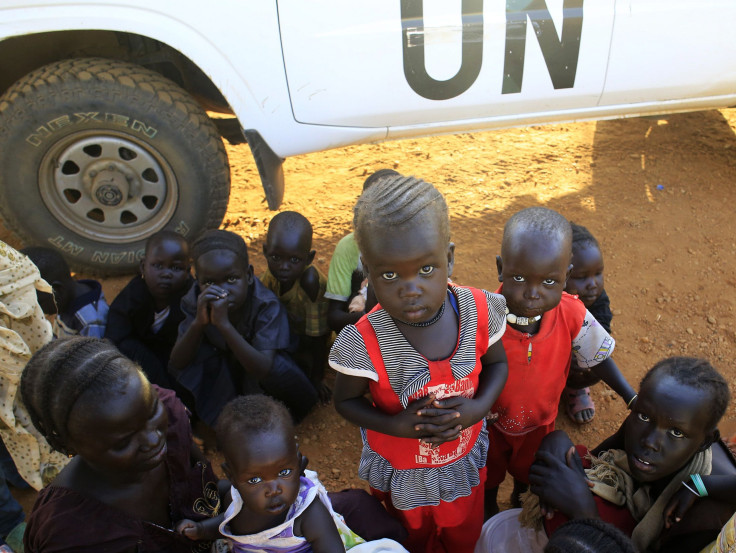Not A Week Old, South Sudan Cease-Fire Agreement Is Already Crumbling

ADDIS ABABA, Ethiopia -- The guns in South Sudan were meant to fall silent on Friday, but ongoing violence in the world's youngest country speaks to the difficulties of achieving sustainable peace in a fractured society.
After six weeks of bloodshed, human rights violations and displacement, South Sudan and its regional partners are still struggling enforce some semblance of calm. The recent conflict has pitted government fighters -- mostly supported by the country's largest ethnic group, the Dinka -- against opposition troops, most of which come from the second largest ethnic group, the Nuer.
Delegates from both sides agreed to a cessation of hostilities last week, but the clashes are ongoing, prolonging a dire humanitarian crisis.
This discord has deep roots. When President Salva Kiir fired his cabinet in July, it was a symptom of the inter-party strife that has threatened the ruling Sudan People's Liberation Movement/Army (SPLM/A) for years, even before it achieved independence from Sudan in 2011. Divisions between the Dinka, to which Kiir belongs, and the Nuer have long been major fault lines in the country's political landscape.
Former Vice President Riek Machar and other sacked party leaders, including key independence negotiator Pagan Amum, criticized Kiir for restructuring the party in late 2013. The disagreement came to a head on Dec. 15, when an armed clash between members of the presidential guard spiraled quickly out of control. Kiir arrested eleven formerly high-level politicians on charges of coup-plotting, but a few, including Machar, fled the capital city. Machar took control of the opposition military, which is predominantly Nuer. Since then, the conflict has cost the lives of thousands of people, while hundreds of thousands have been displaced.
Delegations representing both sides flew to Ethiopia's capital city of Addis Ababa in early January to find a resolution through talks mediated by the Intergovernmental Authority on Development, or IGAD, a bloc of eight Horn of Africa countries. The mood was hopeful when, after three weeks of discussions, the negotiators finally agreed to a cessation of hostilities in a signing ceremony last week at the Sheraton hotel. As the event came to an end, diplomats and mediators ambled out of the hotel amid camera flashes and jostling journalists, congratulating one another in the hopes that the agreement could mark the beginning of the end of an increasingly bloody conflict.
Both sides were meant to lay down arms after 24 hours. But by Friday evening, opposition military spokesman Brig. Gen. Lul Ruai Koang was already accusing the government of failing to honor the agreement, pointing to clashes that erupted in the Unity State towns of Dangdok and Duar, in the Dolied Hills of Upper Nile State, and Mathiang in Jonglei State. “I am giving his information to show you that the government has violated the cessation before it started,” he said to IBTimes. “We have the right to defend ourselves.”
All through the weekend, well after the cessation was supposed to take effect, both sides reported ongoing violence.
On Monday, government military spokesman Philip Aguer said the situation remained restive. “The White Army [an ethnic militia supporting the opposition] today carried out a raid on the village of Jale; they looted the villages and raided cattle,” he said. “There was also an attack south of Malakal, where armed civilians attacked villages.”
Amid the turmoil, humanitarian organizations are bemoaning their inability to access some of the worst-hit places, where thousands of South Sudanese men, women and children are suffering shortages of medical aid and shelter.
“For the cease-fire, we believe humanitarian access should be respected at all times,” said Heather Pagano of Medecins Sans Frontieres (Doctors Without Borders) the day after the cessation agreement was signed. “The insecurity has definitely been our biggest operational challenge in South Sudan, resulting in evacuations of our projects while two projects have been looted in Malakal and [Unity State capital] Bentiu.”
Though Thursday's agreement acknowledged the humanitarian challenges now facing the country, it left plenty of loose ends. It had no conclusive resolution on the issue of the eleven detainees in Juba, though the rebels are insisting on their release so that they can participate in further talks. The agreement also made no direct mention of outside fighters who are accused of aiding the government side, particularly Ugandan troops. Government military spokesman Aguer acknowledges that Ugandan troops are still in the country and “providing technical assistance to the SPLA.”
Opposition Brig. Gen. Koang has also accused a Darfur rebel group, the Justice and Equality Movement, of perpetrating attacks alongside government troops in Unity State, though Aguer denies the allegation.
For the South Sudanese civilians who had hoped that a cessation of hostilities agreement would bring calm to the country, the ongoing clashes are a tragic disappointment. But there is still an opportunity to restore some calm ahead of the next round of talks, which begin on Feb. 7. During the interim, both sides are working to implement a Monitoring and Verification Mechanism for a cease-fire, under the leadership of IGAD.
But even at the moment when these goals were put into motion with the signing of the cessation agreement, South Sudanese delegates and IGAD mediators recognized that wars are difficult to end with the stroke of a pen.
“I would emphasize that agreements and peace deals apparently signed in good faith are many,” said IGAD special envoy Seyoum Mesfin at Thursday's ceremony. “But those successfully implemented are fewer -- far fewer.”
© Copyright IBTimes 2024. All rights reserved.






















